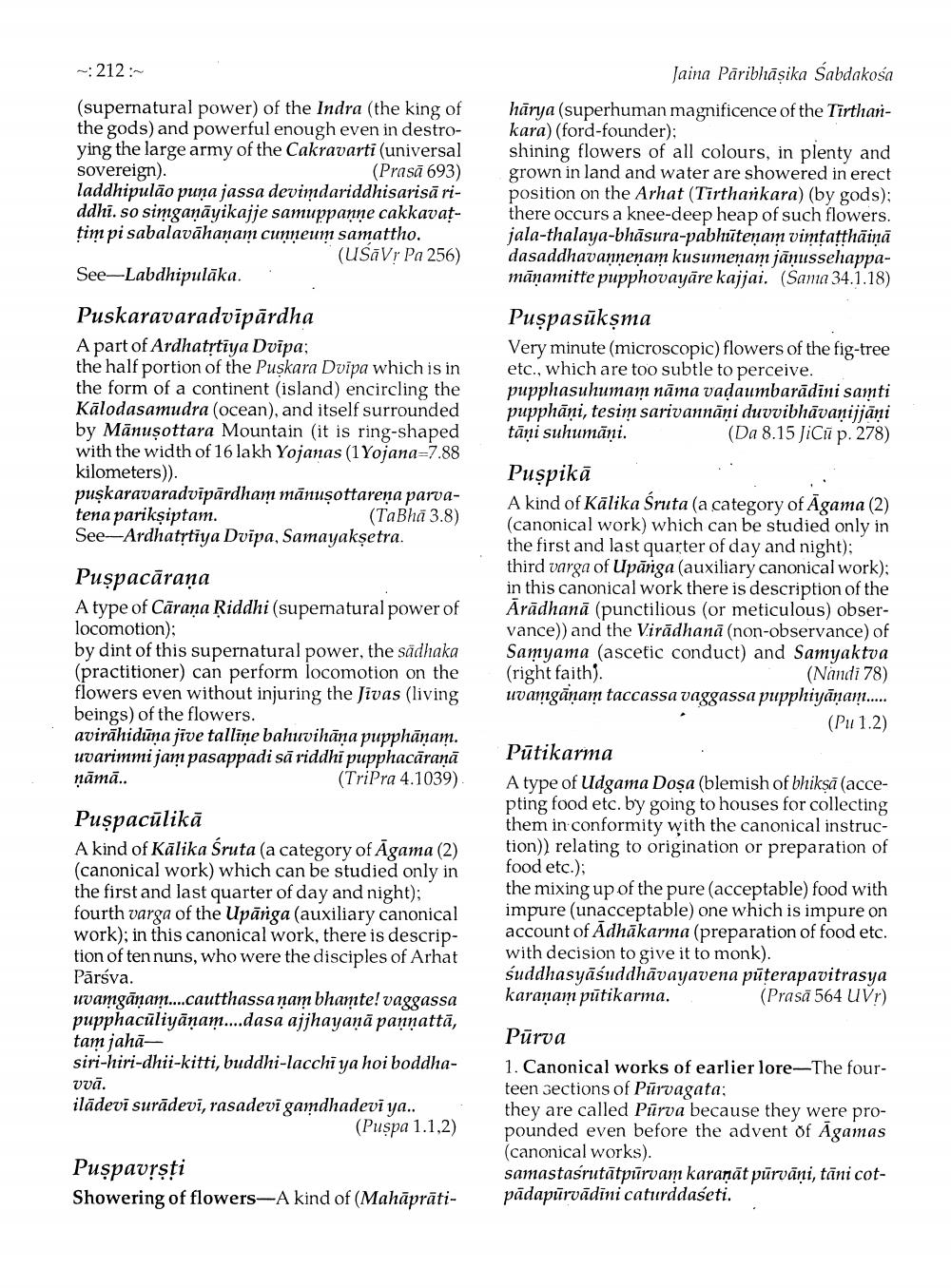________________
212 :
(supernatural power) of the Indra (the king of the gods) and powerful enough even in destroying the large army of the Cakravarti (universal sovereign)
(Prasā 693) laddhipulão puna jassa deviņdariddhisarisā riddhi. so simgaņāyikajje samuppanne cakkavattim pi sabalavāhanam cunneum samattho.
(USãVr Pa 256) See-Labdhipulāka. .
Jaina Pāribhāṣika Sabdakosa hārya (superhuman magnificence of the Tīrthankara) (ford-founder); shining flowers of all colours, in plenty and grown in land and water are showered in erect position on the Arhat (Tirtharkara) (by gods); there occurs a knee-deep heap of such flowers. jala-thalaya-bhāsura-pabhūteņam vimtatthāiņā dasaddhavannenam kusumenam jānussehappamāņamitte pupphovayāre kajjai. (Sama 34.1.18)
Puskaravaradvīpārdha A part of Ardhatrtiya Dvipa; the half portion of the Puskara Dvipa which is in the form of a continent (island) encircling the Kālodasamudra (ocean), and itself surrounded by Mānuşottara Mountain (it is ring-shaped with the width of 16 lakh Yojanas (1 Yojana=7.88 kilometers)). puşkaravaradvipārdham mānuşottareņa parvatena parikṣiptam.
(TaBhā 3.8) See-Ardhatytiya Dvipa, Samayakşetra.
Puşpasūkşma Very minute (microscopic) flowers of the fig-tree etc., which are too subtle to perceive. pupphasuhumam nāma vadaumbarādini samti pupphāni, tesim sarivannāni duvvibhāvanijjāņi tāņi suhumāņi.
(Da 8.15 JiCū p. 278)
Puşpacāraņa A type of Cāraņa Riddhi (supernatural power of locomotion); by dint of this supernatural power, the sädhaka (practitioner) can perform locomotion on the flowers even without injuring the Jivas (living beings) of the flowers. avirähidūņa jive talline bahuvihāna pupphānam. uvarimmi jam pasappadi să riddhi pupphacāraņā nāmā..
(TriPra 4.1039)
Puşpikā A kind of Kālika Śruta (a category of Agama (2) (canonical work) which can be studied only in the first and last quarter of day and night); third varga of Upānga (auxiliary canonical work); in this canonical work there is description of the Ārādhanā (punctilious (or meticulous) observance)) and the Virādhanā (non-observance) of Samyama (ascetic conduct) and Samyaktva (right faith).
(Nandi 78) uvamgāņam taccassa vaggassa pupphiyānam.....
(Pu 1.2) Pūtikarma A type of Udgama Dosa (blemish of bhikṣā (accepting food etc. by going to houses for collecting them in conformity with the canonical instruction)) relating to origination or preparation of food etc.); the mixing up of the pure (acceptable) food with impure (unacceptable) one which is impure on account of Ādhākarma (preparation of food etc. with decision to give it to monk). śuddhasyāśuddhāvayavena püterapavitrasya karanam pūtikarma.
(Prasā 564 UVr)
Puşpacālikā A kind of Kālika Śruta (a category of Agama (2) (canonical work) which can be studied only in the first and last quarter of day and night); fourth varga of the Upānga (auxiliary canonical work); in this canonical work, there is description of ten nuns, who were the disciples of Arhat Pārsva. uvamgānam....cautthassa ņam bhamte! vaggassa pupphacūliyānam....dasa ajjhayaņā pannattā, tam jahāsiri-hiri-dhii-kitti, buddhi-lacchi ya hoi boddhaขza. ilādevi surādevi, rasadevi gamdhadevi ya..
(Puspa 1.1,2)
Pūrva 1. Canonical works of earlier lore-The fourteen sections of Pürvagata: they are called Purva because they were propounded even before the advent of Agamas (canonical works). samastasrutātpurvam karaņāt pūrvāņi, tāni cotpādapūrvādīni caturddaseti.
Puspavrsti Showering of flowers-A kind of (Mahāprāti




